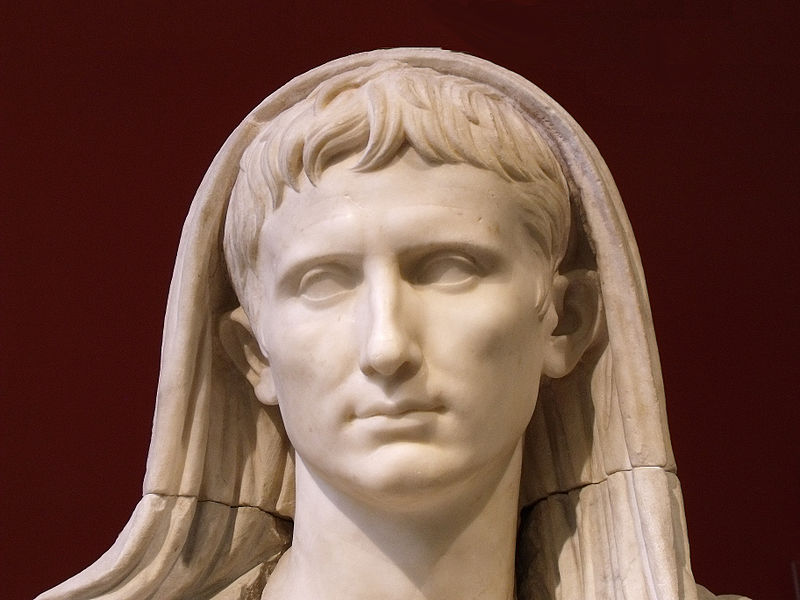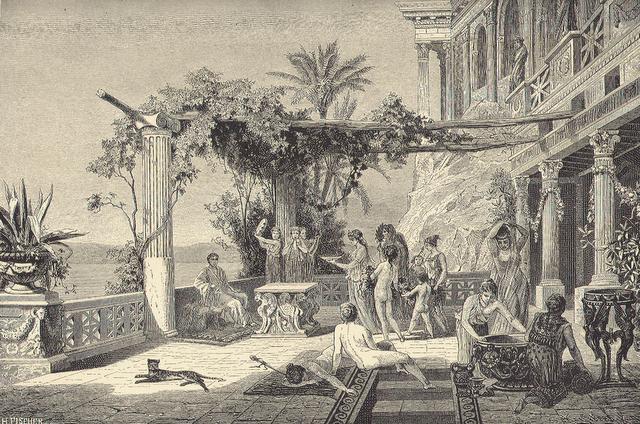Written by Edward Whelan, Contributing Writer, Classical Wisdom
Tiberius( 42 BC –37 AD) was the second Roman Emperor and one of its greatest. He was also a brilliant general. Yet, he is remembered today as a gloomy tyrant who was vey cruel. Tiberius was a very complex man and to this day he is something of an enigma.
The Early Life of Tiberius
The future Emperor was born to Tiberius Claudius Nero and Livia Drusilla of the ancient Claudian family. His father was a supporter of the Optimates and was opposed to the increasing power of Octavian (late Augustus). He was forced with his wife to flee for his life from the anger of Augustus but was eventually pardoned.
However, when Augustus saw Livia he fell in love with her, despite the fact that she was pregnant with her husband’s child. The first Emperor forced Tiberius’ father to divorce his mother.
The young Tiberius was at first raised by his father, but after he died he went to live in the home of his Stepfather Augustus. The strange family circumstances of the young Tiberius are blamed by many for his gloomy and suspicious temper.

Livia and her son Tiberius, AD 14–19, from Paestum, National Archaeological Museum of Spain, Madrid.
Tiberius’ Early Career
Augustus was very concerned about having a heir. From an early date Tiberius was regarded as a potential successor of the First Emperor. He entered public life under the direction of Augustus and was a fine orator and advocate. He soon was given a military command and proved to be a brilliant general. After service in the East, he was given command of several legions.
Tiberius was able to conquer the mountainous area of Raetia (modern Switzerland). Later he would conquer large parts of Pannonia and Illyria, despite facing large armies. Tiberius also launched an offensive across the Danube and defeated the Marcomanni. He was later ordered to Germany where he defeated several tribes. After the death of Augustus’ close friend Agrippa, the First Emperor recalled Tiberius to Rome.
Tiberius in Mid-Career
In 11 BC, Tiberius was forced to divorce his first wife Vipsania, with whom he had a son, Drusus. Augustus made Tiberius marry Julia, his daughter, and consequently became the stepson of his grandchildren. He was cruelly forbidden to even see his first wife.
It seems that Augustus wanted Tiberius to act as the guardian of his likely heirs. However, his marriage to Julia was a disaster and he remained in love with his first wife. His relationship with the Emperor became strained.

Head of Augustus as Pontifex Maximus, Roman artwork of the late Augustan period, last decade of the 1st century BC
Despite this, in 6 B.C. Tiberius was selected to take over de-facto command of the East. He suddenly resigned and retired to Rhodes, where he studied philosophy and rhetoric.
His reasons for this dramatic action are not known. Some have speculated that he was humiliated by his wife’s infidelities or that he felt that he was no longer a candidate to succeed Augustus. After a few years, Tiberius wanted to return to Rome, but Augustus refused him leave to return, despite the pleas of his mother Livia.
Tiberius as Heir
Tiberius could have died in exile but for a remarkable series of events. Two of Augustus’ grandsons died while still young men. The First Emperor had Tiberius recalled and made him his heir. Another grandson of Augustus was later banished. In 12 A.D., Tiberius was made the co-Emperor. It appears that Augustus was reluctant to do so but Livia probably persuaded him to make Tiberius his heir.
Tiberius as Emperor (14-37 AD)
When Augustus died, Tiberius, at least publicly, became Emperor. He was faced with a great many challenges including a rebellion in Illyria and a mutiny among the legions on the Rhine. Germanicus, the son of this brother, ended the mutiny and the rebellion, at least according to the historian Tacitus.
Tiberius was a capable administrator and he strengthened the administration of the Roman Empire and continued the policies of Augustus. He avoided unnecessary wars and the population enjoyed a period of peace and prosperity.
The reign of the Second Emperor is seen as embedding the Imperial system and ensuring that it was accepted by the vast majority of the local elites. However, Tiberius had a poor relationship with the Roman senatorial elite and he held many treason trials and executed many Senators. Germanicus was hugely popular with the populace, and many historians believe that Tiberius had him poisoned.
Retirement to Capri and Sejanus
The Emperor was aware of his unpopularity and is said to have become weary of government. He withdrew to the Island of Capri and the reins of the government were left to Sejanus. He was an Etruscan by birth and was commander of the Praetorian Guard (Imperial bodyguard).
Tiberius stayed in Capri where he allegedly delighted in cruel tortures and sexual orgies. Sejanus ruled Rome with an iron-fist and had many Senators assassinated. However, he soon aspired to the Imperial throne.
Sejanus began an affair with the daughter in law of Tiberius. Later he had the Second Emperor’s son poisoned, but made it appear as having been a natural death. Tiberius was not aware of Sejanus’ actions, until he was informed of them. Tiberius then had Sejanus and his family summarily executed. However, he still did not return to Rome and power was largely in the hands of the successor of Sejanus in the Praetorian Guard.
The Second Emperor was somewhat paranoid, and he had many potential heirs killed off for no particular reason. Eventually he decided to make Germanicus’ son, Caligula, his heir along with his only grandson, Tiberius Gemellus. It is widely suspected that Caligula and the Praetorian Prefect had Tiberius suffocated or poisoned.
Tiberius’ Legacy
The Second Emperor did much to ensure that the Imperial system managed to survive the death of Augustus and his shrewd administration, preventing another outbreak of civil war. He could be brutal, but his cruelty and tyranny were overstated by later Roman historians.
Is it possible that, perhaps, one might be a great emperor and a monster? I leave that for you to decide, dear reader.












No comments
Trackbacks
Our apologies, you must be logged in to post a comment.